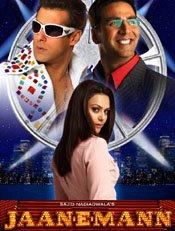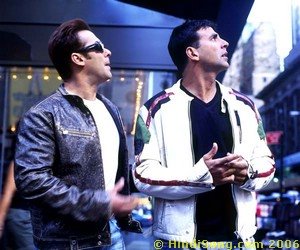There are many incentives for a film-maker, specially one like Sanjay Leela Bhansali, to go into a project which marks his departure from the regular fare of monotonous, epic-grandeurish movies that he has made till date, to a songless, seemingly-realistic fare, that plans to convey a message on a very serious topic of discussion. He wants to prove to the world that he has what it takes to deliver on a more aesthetic, 'arty' level of magnificence that is lacking in most directors of the times. He believes himself to be at par with perhaps Guru Dutt or Balraj Sahni, or maybe even a Raj Kapoor. So what does he do after making non-sense like Hum Dil De Chuke Sanam and even great rubbish like Devdas? He goes and makes something which is a mix of the two - he goes and makes Black!
One aspect of art-house cinema, that is firmly embedded in the minds of the current 'trying to go new-wave' directors is that art films need to be boring, slow and accutely didactic. After all the movie is meant to give a message, to make the viewers think of a subject in newer light ... So what if Shyam Benegal made Ankur, he probably meant to give a message! Sanjay L Bhansali now grabs on to his "warriors of darkness" and tries to say something about them. It is the concentration of the message that gets into him so badly, that he obscures it completely within the reels of the movie. He remembers the self-flouted doctrines of pace (or the lack of it) of the film that he ventures into making it melodramatic. He tries to fill us with pathos and agony at the sight of his characters and he tries to forcefully enter into the audience's hearts to make them get up and take notice - and that is where he fails.
Black deals little with the situation of the deaf, blind and mute population of our country, but forcusses primarily on a deaf, blind and mute girl. It deals with her predicament, her sense of belonging in the world of perfectly functioning people. It deals with her struggle for existense, her never-say-die attitude, her optimism and her "teacher". But nowhere does it speak for the deaf, the dumb or the mute. Every event in her life is made into a gargantuan struggle before able bodies and thereby making her success all the more glorifying.
The seeds of melodrama are sown right from the begining, when the girl's mother revolts against her husband's decision to put her in a special school. I ask, what is so wrong in that? Isn't it the most wise thing to do in such a situation? Her mother's indiosyncratic manouverisms only end up throwing a spanner in her life! And if Bhansali didn't want this drudgery of melodrama to be inflicted on his viewers, he should have made the girl come from a destitute background, whereby her struggle wouldn't have been optional, but incidental. However, if he had done that, how could he fit in the "teacher" in his scheme of things?
Bhansali has merely applied the tools of an art film, but due to his lack of expertise in the matter, what has come out as the final product is anything but the idealist outcome he could have hoped for. In this context, I cannot help mention another movie that was released recently, dealing with the predicament of the third-sex in India. The movie, Navrasa by Santosh Sivan brilliantly captures the hopelessness of a 13 year old girl's uncle, who actually harbours the sentiments of being a woman. It does start of like Black does, but that is where the comparison ends. Instead of going away from a world of similar people, Navrasa goes right into it. Blending reality with myth, Sivan spins magic around the life of enuchs in India and essentially, never makes us feel any pity for them. The audience feels proud that they have created a world of their own. The audience joins them, rather than shower them with tears from the front of the curtain. That is the power of good cinema.
What makes Black a delight to watch are the performances. The young girl, Mitchelle, played by Ayesha Kapoor, is a powerhouse performance. Her eyes, her movements, her body-language, makes you believe that she really is what she is meant to be. Maybe Rani Mukherjee doesn't invoke much prowess in her skills, mainly due to the over-shadowing performace of young Kapoor, but it's true that no one in the Indian film industry could have done what she did. Shehnaaz Patel feels very significant as the lost, hopeless mother of a blind, deaf and mute girl and Dhritiman Chatterjee fits in beautifully as the pragmatic, yet loving father. And finally, the movie belongs to Amitabh Bachchan. At the age of 62, this man is a moving magician (incidently, that's what he is in the movie too, a "magician"). His nuances, his dialogues, his energy levels just fill you with awe. There is perhaps no actor in the world who could have done what he did, at this age too.
Black's significance and power lies in its performace and in its cinematography. Ravi K Chandran makes magnificient use of the predominant colour symbol in the movie and tries to create binary opposites without his camera getting preachy like the director.
Lets hope Sanjay L Bhansali returns to his earlier rubbish in his forthcoming Bajirao Mastani. At least there we can sleep it off in the cool confines of the theatre, rather than try to be awake, hoping that as promised, somewhere in the movie Bhansali will make things turn to something spectacular, to something worth watching.
[PS. There is one thing that I forgot to add, he has one more thing which goes to the film's success as the box-office - a stupid and equally melodramatic audience, who couldn't stop crying at this total hoch-poch, at this NONSENSE ...]


